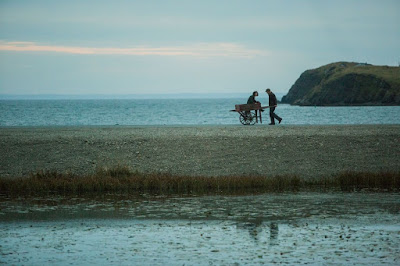It is star chef week, with a bloke I’ve not heard of, a Kiwi apparently - in World’s top 50 best restaurants - Ben Shewry (http://www.attica.com.au) setting a mystery box challenge tonight. What the hell is Matt wearing this time? Always a bit different, but its a green suit with a long coat.The audience seem to know Ben - Sarah calls him a living legend. He’s a forager. So - what’s in the boxes? Scallops, sea lettuce, wax flower, wattle seeds, fresh cheese, juice of lemon aspen, quandongs and kangaroo. Good luck people! These are the true taste of Australia, apparently.
Most seem to be taking the ingredients in their stride. What about the judges? George knows what to do with kangaroo and scallops - but anything else? Ray goes with the lemon aspen for an ice cream sandwich, using the wattle and the quandong. Sam - kangaroo pancake, wattle seed crepes. Tamara - brik pastry stack, lemon curd and quandong compote. Benjamin is lost. Trent on to it, quandong semi-freddo, cheese mousse and lemon sorbet - we see his backstory.
Kangaroo carpaccio, smoked quandong mayonnaise, lemon and cheese sorbet from Jess. Will Tamara get some pastry made - it keeps breaking? Eloise - quandong tart, wattle seed pastry, lemon mousse. Nicole - kangaroo tartare with smoked egg yolk (one of Ben’s dishes). 20 minutes to go and Tamara finally gets some pastry, needs lots more.
Poor Ray - told his dish is simple so must be perfect.
Tasting - they'll only taste five, which makes all the noise about how everything is about the taste a bit of a joke. These will be drawn from those we’ve concentrated on, yes? Poor Eloise broke her tart. Jess is first up. Raw roo doesn’t work for me. Judges love it - nice balanced dish, well thought out, no negatives. Tamara - thinks they’ve called the wrong name - judges love this one as well. Trent - more love from the judges! Knew none of the ingredients, but nailed it. Nicole - more raw roo. Not quite so much love - well made but maybe needed something. Stir frying? Ray is last up, looking confident. Nothing left when the judges are done. I reckon its down to him and Trent.

Ray gets the nod, with the above ice cream sandwich. Now for the invention test - he has to pick between pickling, curing and smoking. He goes for smoking. They also need to forage in the garden. Sarah seems happy. Ray's worried - winners normally go to bottom three. George - use the whole garden! Back to see Jess at home, in family garden. She has a very busy dish: smoked white chocolate and lemon myrtle mousse, kale and cucumber granita, peach jam and granola. Dessert?

Sarah has coriander crusted pork, roasted fennel, smoked apple puree and chips. She wants a pork and wine restaurant - sounds good to me. Eloise - smoked whisky and chocolate ice cream sandwich, roasted strawberry and rosemary shortbread. Sam not started - 15 minutes in, too many choices. Goes with rice pudding with smoked ice cream and apple. Pia - smoked scallops parsnip puree, proscuito - doesn’t sound very inventive, I'm sure I have eaten something similar. Pete - pan fried fish and a smoked fish broth. Ray - cray tail, smoked corn, some sort of broth - not going right in terms of flavour. Judges visit Sarah - Matt asks if she can do more from garden - horseradish, she decides. Sam’s away, enjoying himself. I keep seeing someone cooking chops and think yum. Sarah’s puree “so good!” - now its down to the pork. Matt impressed at how calm Pia is. Poor Pete - he has a loss of flavour as well, smokes his fish to make up for it. Ray still doesn’t like his cray, not much smoke in the mix. Sarah’s pork is “freaking awesome” (at least she thinks so). Pia has one minute, uncooked scallops and a cold pan. Yikes. Throws them at her plate! No herb, no proscuitto.
Judging. Sarah: Ben is excited to try her dish - plating and elements all good - fantastic job with pork, never had it cooked that well! I’m smiling for her. Ray unhappy jamon broth - bad sounds from judges - corn excellent, rest not so much, cray not cooked - his goose is. Arum smoked duck, herb custard, pickled fennel, orange dressing “yummy”. Samuel - hot smoked mackerel, charred chard, potato. Tamara - smoky herbed potato salad - not enough. Callum - crispy skinned chicken with smoked passionfruit caramel and green salad “massive tick on inventiveness”. Michelle - busy dish! Smoked chocolate mousse, jelly, crumbs - midrange. Jess - “my garden” looks fabulous, they play it cool, but love it. Pete - Gary doesn’t like the broth, and there’s no smoke. Eloise - only 3 sandwiches for 4 judges - “unexpected”. Ben tells story of going to San Francisco to one of greatest bakeries in all the world for an ice cream sandwich - this is as good as that. Adult decadence, inspired. Smiling for her as well.

Pia - nothing from garden on the plate, half finished dish but cooked well. “Prepare yourself, Pia.” Sam - they like the look of his dish, a bit deconstructed as he made the nutmeg milk skin separate. More coyness from judges, then they let loose - nailed it, best presentation, delicious. We missed some e.g. Diana.
There are four front runners but they only want three: Sarah, Jess, Sam, but Eloise for the win?
Ray, Pete, Pia to lose.
Dish of the day - Eloise. Ben has tried but failed to make ice cream sandwiches as good. Jess not in top three.
Bottom three as predicted.

















































